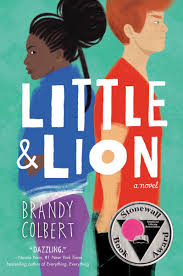Not much of a roar
Brandy Colbert’s sophomore novel is not as poignant as it tries to be.
February 18, 2019

Brandy Colbert’s second novel “Little & Lion” tells the story of Suzette (the titular “Little”) as she returns to California from her New England boarding school for the summer. Over the summer Suzette deals with her brother Lionel’s recently diagnosed bipolar disorder while simultaneously questioning her sexuality.
I did not dislike this book; it was an easy read and kept me fairly engaged, but Colbert seemed to be reaching for something she could not quite catch. While diverse, “Little & Lion” could not decide what the central point was. It was about Suzette’s identity as a black Jewish woman, her newly discovered queer identity and her brother’s mental health, but it never really came to a conclusion about these things. I feel bad for not liking this book as much as the reviews said I would since it was on every list about LGBT+ fiction when it came out. I was excited for it.
“Little & Lion” feels performative in its representation. Colbert’s cast of characters do not have enough depth. Their personality traits can be chalked up to simple archetypes like “bitch,” “musician” or “slutty lesbian,” and they often feel like decoration. The few moments that make good points are overshadowed by the clumsy depictions of queer women. Besides the main character, all of the queer women in this story were generally unlikeable. The lesbians were mean and the bisexuals were cheaters, but Suzette’s straight male love interest was practically flawless.
The one message that comes through clearly is the bond of family, and I wish Colbert had kept her focus on that. Suzette’s relationship with her brother was the most complex thing in the book and deserved more than it got. Suzette cares deeply for Lionel- this manifests through hyper-vigilance when it comes to his bipolar disorder. Her journey to accepting Lionel’s issues is what makes the book worth finishing. Often stories about how mental illness affects families can feel like they are vilifying the person with the illness, but Colbert avoids falling into this trap. Lionel is written with sensitivity, as are his family members. Suzette must realize that she is not responsible for her brother’s mental health, and that it is not her job to keep his secrets.
Overall, I think this book is meant for a fairly specific person- that person just was not me. “Little & Lion” could be a great read for someone who might be questioning their identity or dealing with a family member’s mental illness, but it does not really have anything all that new or interesting to say. Colbert wanted to create a moving piece of literature, yet whatever she wanted to say got lost in her messy plot.
